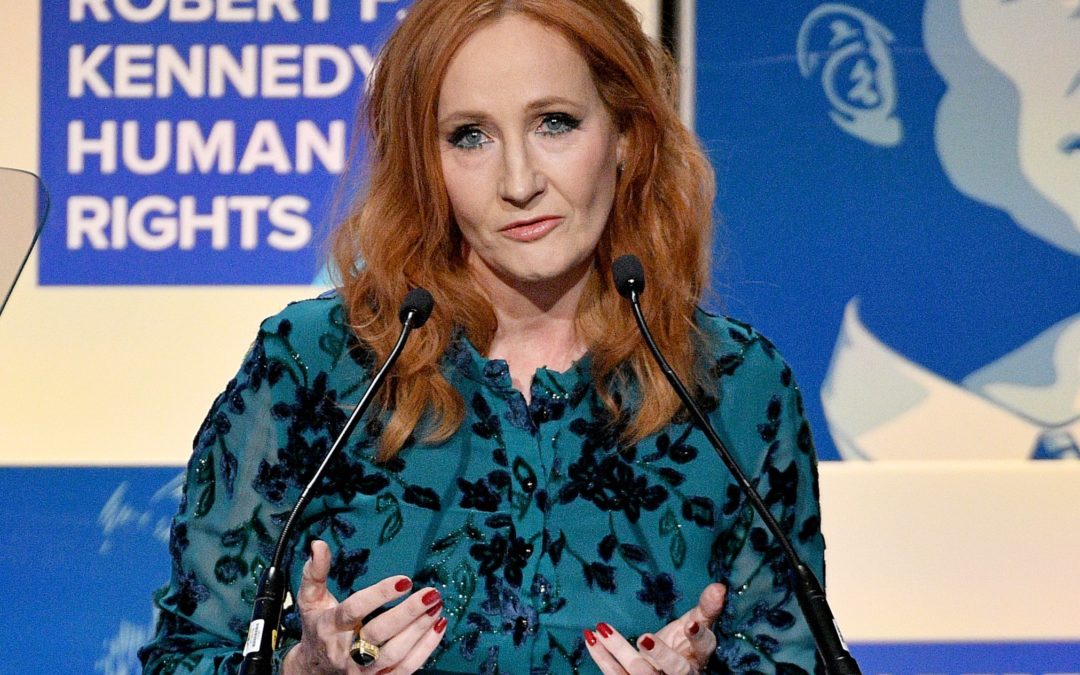 Summer 2020: global state of emergency, populist right-wing backlashes all over the world, peak of police brutality, overwhelming turnouts at Black Lives Matter protests, increasing belief in absurd coronavirus-conspiracies, and yes, we are also still in the middle of a climate crisis. This year, we have been facing challenges on many levels, so brace yourselves because J.K. Rowling decided to up the game.
Summer 2020: global state of emergency, populist right-wing backlashes all over the world, peak of police brutality, overwhelming turnouts at Black Lives Matter protests, increasing belief in absurd coronavirus-conspiracies, and yes, we are also still in the middle of a climate crisis. This year, we have been facing challenges on many levels, so brace yourselves because J.K. Rowling decided to up the game.
On 6 June 2020, J.K. Rowling publicly commented on an article entitled “Opinion: Creating a more equal post-COVID-19 world for people who menstruate.”. She tweeted, “‘People who menstruate.’ I’m sure there used to be a word for those people. Someone help me out. Wumben? Wimpund? Woomud?” thus obviously defining women by their menstruation. Is this transphobic or just a faux-pas? In order to find out what is or is not transphobic, the only group one needs to ask is the transgender community.
Immediately, the Twitter community reacted and highlighted that trans men might menstruate while trans women might not, that gender queer people might or might not experience periods, too. People talked about their own experiences with periods and the message is crystal clear: women ≠ menstruation. Even an app which tracks menstrual cycles engaged in the discussion by emphasising that feminism has been trying to establish a non-gendered language for years, including detaching the image of women from that of the uterus. Their argument: today, it might seem awkward to say people who menstruate, but it also seemed awkward for a long time to say firefighter instead of fireman. The responses to Rowling’s tweet escalated in their abundance over a few days, making clear time and again that the statement does simply not resonate with a 21st century public.
The author responded by explaining she knows and loves transgender people but erasing the idea of sex would mean the erasure of female struggle. Many commented, as you will surely guess, that she misses the point – sex and gender are two different issues. At this point, I would like to stress that the sex/gender difference is no longer a hypothesis but a theory fully employed in and validated by medicine. A physician tweets: “As a physician, I want people to know that sex exists on a bimodal biological spectrum just like gender exists on a bimodal sociological spectrum. While most identify as either female or male, there are intersex and trans individuals whose identities are just as valid and real.”. On 10 June, Rowling linked a blog post about her reasons to speak up. For the first time, she spoke about her history of domestic abuse and sexual assault – not to garner sympathy, she specified, but to explain why single-sex spaces are so important to women with similar experiences.
At least this positioning would leave some space for a dialogue. Feminism is not a field with a specific definition; feminism is decentralised and its organisation confusing, multilateral and controversial. In the last few decades, it has become very clear that intersectionality is the only framework in which feminism can achieve its goals. Yes, women* can have similar struggles as women*, but their class, ethnicity and sexual identity cause a series of very different discrimination issues and even make a tremendous difference in how they experience the same struggles. A Black middle-class lesbian woman is confronted with different problems than a Bangladeshi straight woman who just migrated to Europe. A person is never judged by only one feature, which defines the biggest difference to mainstream feminism variations of the past. Modern feminism is inclusive, whereas the leading ideas of 70’s feminism considered only white, middle-class women. However feminism has evolved over the decades, these differences were J.K. Rowling’s leeway, her chance to argue how an exclusive space for cis-women might or might not translate into a kind of empowerment for the specific group of people who experienced sexual violence.
Instead, in her 3600-words essay, Rowling blames the increase of transitions of girls on misogyny and sexism. She culminates by stating that she might have tried to transition, too, had she been born 30 years ago. Yes. Take a second and breathe in: she might have tried it. On 5 July, she further claims hormone replacement therapy is only “a new kind of conversion therapy for young gay people”, an extremely offensive allegation. The free – and by the way not easy to make – choice of transgender people to live their gender identity is compared to an oppressive system trying to change the sexual orientation of people in order to fit them in a certain form of society. Isn’t free choice by definition the exact opposite? She adds an insult addressed to doctors and patients who prefer the “laziness” of pharmaceuticals to the “real” healing of the soul. In other words, Joanne K. Rowling affronts transgender people yet again by counting their identities as disease.
Not only does she defame the trans community as a whole, but she discredits the decision individual people have had enough courage to make. For the author, people who transition can only be traumatised: the only possible reason for a transition is a sexist society. She utilises single cases of individuals who detransitioned to prove her point, but according to hard facts, less than one percent of transitioned people showed regrets in 2016 and 2017. Ever since the first tweet, Rowling has blackened specific clinics offering hormone replacement treatments by claiming they were experimenting on young people, and she and other academics signed an open letter condemning the so-called cancel culture. Famous names such as Noam Chomsky, Gloria Steinem, Matthew Yglesia and trans activist Jennifer Finney Boylan appear on the document, but directly after reading the transphobic manifesto, many of the scholars and activists distanced themselves, apologising for not being well enough informed before signing the letter.
Ironically, many transgender people had stated to have found an escape in the Harry Potter novels and to have felt encouraged by certain Harry Potter characters to out their true gender identity or sexual orientation. The Harry Potter queer fan community is bitterly disappointed by their former idol. But there are some good news, too: Harry Potter itself is not a transphobic novel, and neither is the main cast of the Harry Potter movie. Discussions about racism have appeared, too, for example around Cho Chang, but the storyline does not discriminate against the LGBTQ* community. Most of the actors distance themselves clearly and publicly from all transphobic statements the author has made, and they encourage fans of the Potterverse to hold on to the message of love that is preached throughout the novels. Daniel Radcliffe addressed the queer fan community directly, stating he is sorry for the hurtful comments that have been made by the author but insists that nobody can take away the positive effect the Harry Potter world has had on so many people. Emma Watson, Bonnie Wright, Rupert Grint, Evana Lynch and Eddie Redmayne (Fantastic Beasts and Where to Find Them) have all published statements in which they express their disagreement with Rowling. Stephen King, Margaret Atwood and many others have also already reacted and stated their disapproval of Rowling’s transphobia, so you can still go ahead and be a fan of The Dark Tower or The Handmaid’s Tale.
The climax of this debate is the new book entitled Troubled Blood that Joanne K. Rowling (maybe sarcastically, we cannot be sure) published under a male pseudonym, Robert Galbraith. The book, published in September 2020, tells the story of a psychopath serial killer who wears a dress. After all the dispute, I can’t but think this cannot be a simple coincidence. She had already retweeted a statement referring to transgender people as “men in dresses” years ago. One can only speculate whether or not the book resulted as an answer to the summer debate as she has not yet made any statement about it.
However you make up your mind about the author, do remember Munroe Bergdorf’s quote:
“J.K. Rowling is not a scientist. She is not a doctor. She is not an expert on gender. She is not a supporter of our community. She is a billionaire, cisgender, heterosexual, white woman who has decided she knows what is best for us and our bodies. This is not her fight.”
Sources:
https://www.bbc.com/news/uk-53002557
https://www.scotsman.com/arts-and-culture/books/jk-rowling-twitter-why-harry-potter-author-has-been-accused-transphobia-social-media-platforms-2877977
https://twitter.com/jk_rowling
https://www.tagesspiegel.de/gesellschaft/queerspiegel/transfeindliche-tweets-von-j-k-rowling-bestsellerautorin-zieht-wut-von-queeren-harry-potter-fans-auf-sich/25903810.html
Picture source: https://globalnews.ca/news/7142429/j-k-rowling-tweets-hormone-conversion-therapy-backlash/


